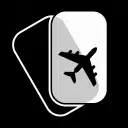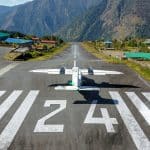Touched by the TSA

There’s nothing like getting to the airport and making your way through ticketing and baggage drop-off to round the corner and see the number of people in line for the preflight security check. More than having to scrutinize your baggage and ensure that your liquids and toiletries are separated properly, you know that even if you make it through the X-ray scanner yourself, either you or your baggage could be subject to additional screening measures. The Transportation Security Administration (TSA) has faced its own series of criticisms for everything from the nature of their pat-downs, to the manner in which they select people for extra screening. To understand this criticism better, we surveyed over 1,000 people across the country about how they feel when they or their partners are picked for screening. We broke down their responses to see which races, religions, and political affiliations were the most bothered by the obtrusive measures sometimes employed by the TSA and even which ones were OK with the idea of racial profiling. Curious what we discovered? Read on to find out.
Don’t Touch Me
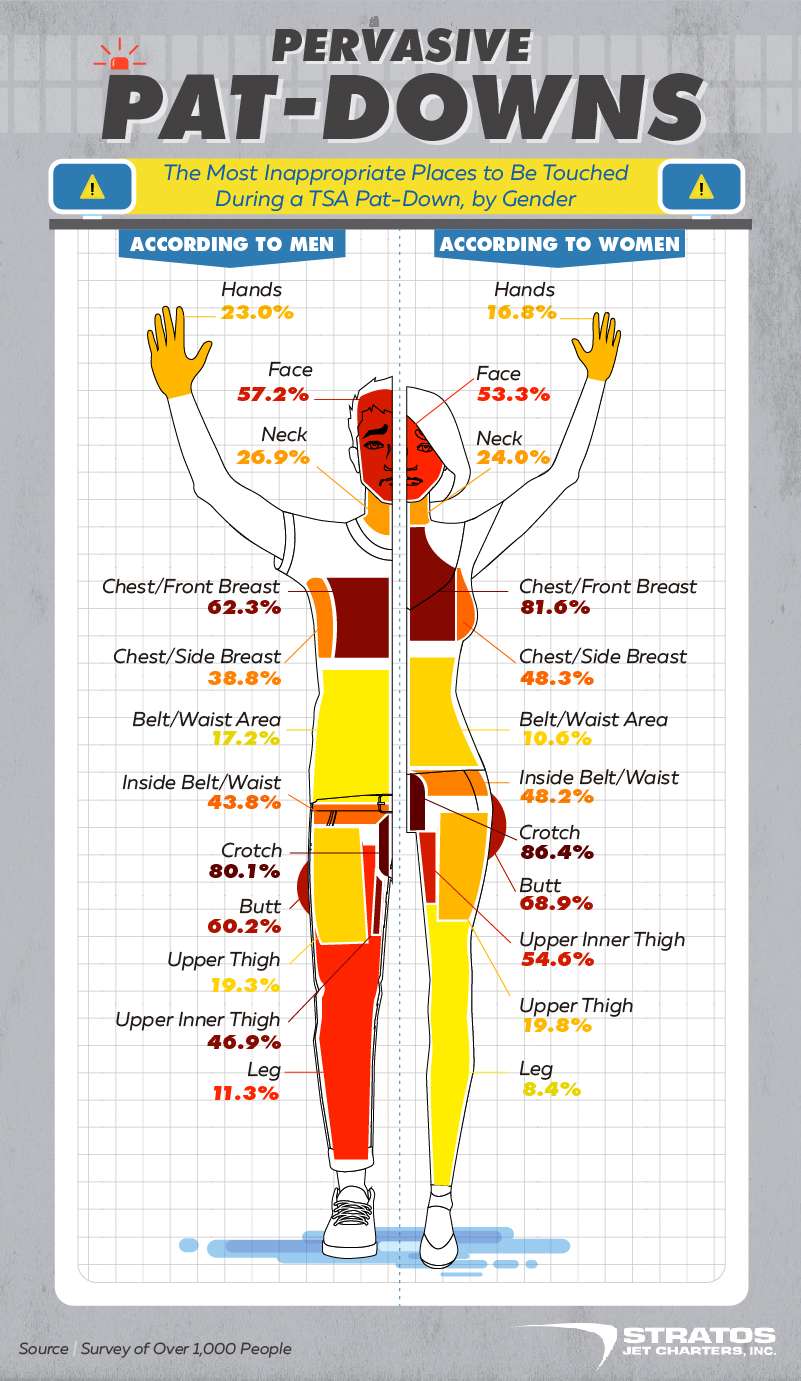
In early 2017, the TSA adopted new “enhanced” measures when it comes to the way they pat down passengers coming through security. Perhaps because of the generally uncomfortable, and sometimes seemingly invasive, measures taken by the TSA in these pat-down procedures, these changes in protocol were kept relatively quiet. After they were implemented, some critics likened the new measures to a form of “legal groping.”
We asked our survey respondents which parts of their bodies were the most inappropriate places for a TSA agent to touch during a screening. According to both men and women, the crotch area was considered to be the most inappropriate. According to reports about the new pat-down procedures, TSA officers are allowed to use the front side of their hands (rather than just the backs) to inspect sensitive areas like the groin and buttocks.
Women were significantly more sensitive to the idea of TSA screeners touching their chests and breasts, and more than two-thirds of women also told us that TSA screeners touching their buttocks was inappropriate. More than half of both men and women we polled said it was inappropriate for agents to touch their faces.
The least sensitive areas for men and women included their legs, and women were more comfortable with agents touching their hands than men were.
Emotional Responses
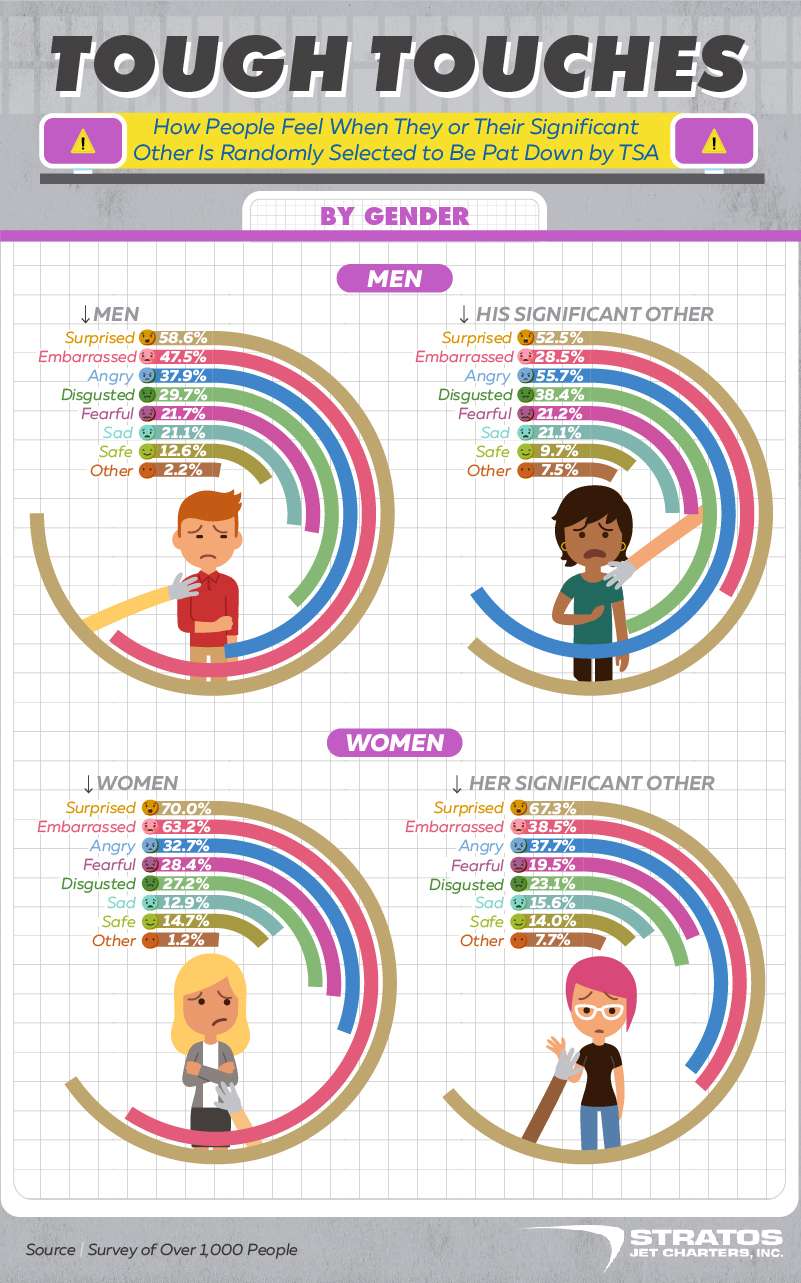
While the TSA’s efforts during the security screening process are designed to ensure passenger safety while flying, some travelers have encountered some pretty uncomfortable situations when they’ve been tagged for additional screening measures. From unique jewelry that gets picked up by the X-ray system to video game consoles that could be mistaken for weapons, there are a number of things that can lead to an awkward encounter with the TSA.
When we asked men how they felt when they were selected for additional pat-down measures, more than half told us they were surprised, and nearly half also said they were embarrassed. While over a third told us it made them angry when they had to endure a pat-down, men were far more likely to be upset when their significant others were tagged for screening. More than half of the men we polled told us they were mad when the TSA pulled their significant others for a pat-down.
Women were more likely to feel surprised than men and far more likely to be embarrassed by the additional screening process. Nearly two-thirds of women told us they found the experience embarrassing, and more than a third said they felt the same way when it happened to their significant others.
Less than 15 percent of women and 13 percent of men said they felt safe when either they or their significant others were pulled for additional screenings.
Racial Perceptions

We also assessed survey responses to TSA pat-downs by race. In the past, the TSA’s measures and screening selection processes have been criticized, with some critics stating that TSA screeners seem to profile certain individuals based on racial features, like their hair (although, those measures have since been reversed).
According to our survey, African-Americans were the least likely to be surprised when either they or their significant others were tagged for additional security measures. They were also the most likely to feel angry about the process, regardless of whether it was themselves or their partners who had been flagged.
More than two-thirds of the people we polled who identified as multiracial or biracial told us they felt surprised when they were selected, and they were generally also most likely to feel embarrassed. Just under 15 percent of people we surveyed who identified as Hispanic said the extra measures taken against their significant others made them feel safe – the highest of any ethnicity we surveyed.
Religious Opinions

Our study also found survey respondents who identified as Jewish were most likely to feel surprised when they or their significant others were tagged for additional screening measures at the airport. Jewish survey participants also told us they were the most likely to feel angry about being singled out at the airport, with nearly two-thirds telling us they felt angry when their significant others were forced to participate in additional pat-downs. They were also among the most likely to feel embarrassed, along with people we polled who identified as Catholic.
Christian survey respondents were the most likely to feel safer when they (over 18 percent) or their partners (15 percent) were selected for pat-downs.
More than 1 in 4 survey respondents who identified as atheist, agnostic, Jewish, or Catholic told us they felt afraid when they were selected for additional screening by the TSA.
Political Divides

In May 2017, President Trump released a budget proposal that – if passed – could impact the TSA and airline travel in general. While the suggested hike in airline ticket fees (meaning higher ticket prices for flyers) would equate to more money for the TSA, the budget adjustments could also result in fewer agents patrolling public areas inside airports.
According to those we polled, more than two-thirds of both Democrats and Republicans said they felt surprised when they were pulled for additional screening by the TSA. While more than 1 in 4 Republican respondents said they felt disgusted when they or their partners were forced to participate in pat-downs by airport security, Democrats were more likely to feel angry or embarrassed about the situation.
Libertarian voters, as well as voters who put themselves in the “Other” category, were the most likely to feel angry about being forced to participate in a TSA pat-down. More than 1 in 5 Republican voters said it made them feel safe – more than any other political party affiliation.
Racial Profiling by the TSA
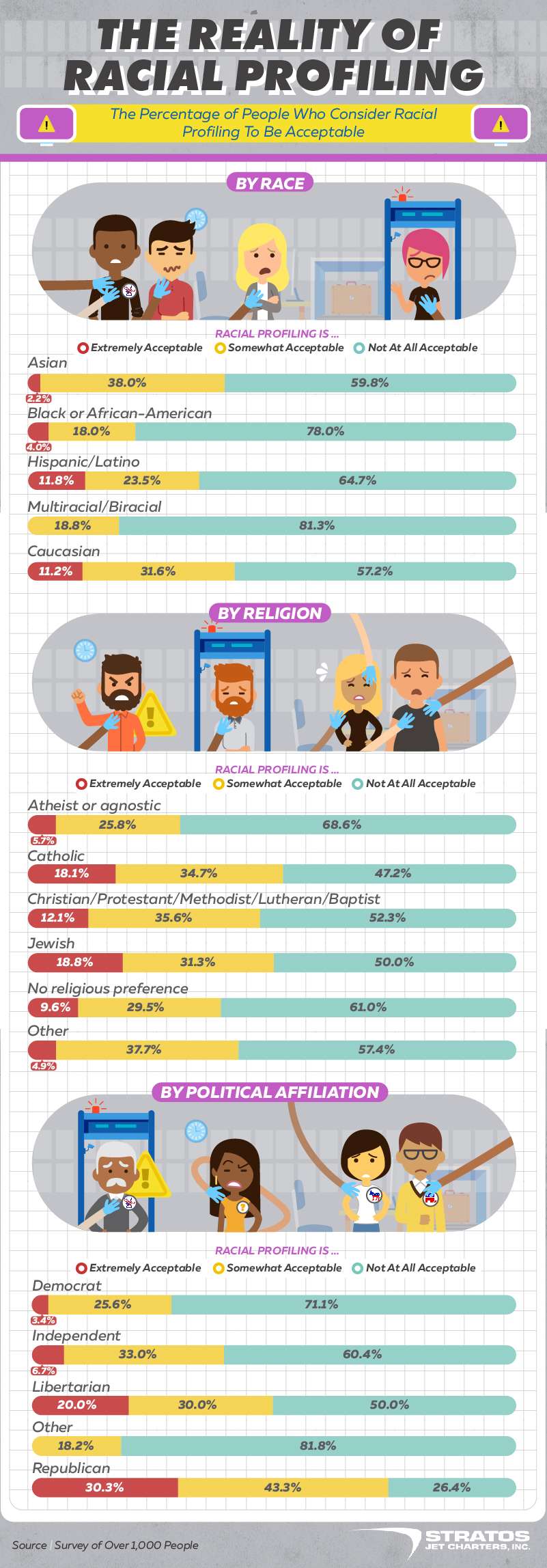
Skip the Invasiveness
Getting through airport traffic, parking, and ticketing is all hard enough without piling on the reality that getting through airport security could take as long (or longer, in some airports) than all of that other stuff combined. Pat-downs don’t just take forever to get through, they can feel extremely invasive. Many of the travelers we polled said they felt surprised, embarrassed, and even scared when they were pulled for additional screening by members of the TSA. If you want to fly in comfort and skip the hassle that is the TSA, consider flying with Stratos Jets. When you fly private, you don’t have to worry about traditional security checkpoints, saving you both time and emotional distress when you or your loved ones get caught up in the TSA security line. Just as safe as commercial flying, Stratos Jets also provides the best in service along with valuable membership benefits to make your ideal flying experience as affordable as possible. Visit us today at StratosJets.com to learn more.
Methodology
We surveyed over 1,000 people about their feelings when being selected for searches and pat-downs at the airport.
Sources
- http://www.cbsnews.com/news/boys-controversial-tsa-pat-down-spd-sensory-processing-disorder/
- http://time.com/4715428/tsa-pat-down-boy-video-jennifer-williamson-dallas-airport/
- http://www.latimes.com/business/la-fi-tsa-pat-down-20170306-story.html
- http://www.newsweek.com/new-tsa-pat-down-techniques-airport-legal-groping-577319
- https://www.dailymail.co.uk/news/article-4280640/TSA-announces-invasive-invasive-pat-process.html
- http://www.destinationtips.com/air-travel/15-tsa-horror-stories-thatll-make-stop-flying/
- https://www.theguardian.com/commentisfree/2012/dec/20/tsa-natural-hair-patdown-racial-profiling
- https://www.usatoday.com/story/news/2017/05/23/trump-budget-tsa/102070110/
- http://thehill.com/policy/transportation/278890-tsa-under-investigation-for-racial-profiling
- http://thehill.com/regulation/court-battles/337867-supreme-court-weighs-fate-of-trump-travel-ban-order
- https://www.usatoday.com/story/travel/flights/2016/03/07/private-jets/81335680/
Fair Use
Hate trudging through airport security? Don’t feel like you have to fly solo. We’d love to see the results of our study shared with your readers for any noncommercial use. We only ask that you ensure a link back to this page so that your readers can see the results of our study in their entirety.
Are you ready to book your Milan and Rome charter flight yet?
Our friendly, expert air charter agents are here to answer questions or start your quote today. Don`t wait, call now and we'll get you on your way to your destination!
Call 888-593-9066




